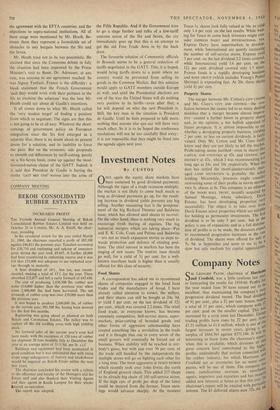Investment Notes
By CUSTOS
ONCE again the equity share markets have been sustained by good dividend payments. Although the signs of a trade recession multiply, the market is not likely to come back much as long as dividend payments go up, for the result- ing increase in dividend yields prevents any big selling. Another reassuring fact is the 'postpone- ment of the big Richard Thomas and Baldwins issue, which has allowed steel shares to recover. On the other hand, there is nothing very much to encourage fresh buying of equities. The big industrial mergers which are taking place—Pye and E. k. Cole, Coats and Patons and Baldwins —are not so much expansion moves as steps to- wards protection and defence of existing posi- tions. The chief interest in markets has been the staging of new issues. The SAMUEL issue should go well, for a yield of 3f per cent. for a well- known merchant bank is higher than is usually offered for this class of security.
Food Shares
A correspondent has asked me to recommend shares of companies engaged in the letail food trades and the manufacture of bread. I have already called attention to RANKS, the millers, and their shares can still be bought at 24s. 9d. to yield 5 per cent. on the last dividend of 121 per cent., which was covered 2.2 times. The retail food trade, as everyone knows, has become extremely competitive. Self-service stores, super- markets, price-cutting of branded goods and other forms of aggressive salesmanship have created something like a revolution in the trade and it is thought that one in every seven of the small' grocers will eventually be forced out of business.. When stability will be reached is any- body's guess, but with just over 50 per cent. of the trade still handled by the independents the multiple stores will go on fighting each other for a long time. The most aggressive is TESCO STORES which recently took over John Irwin, the north of England grocery chain. This added 217 shops to its already big chain of 160 self-service stores. If the high rate of profit per shop of the latter could be secured from the former, Tesco earn- ings would advance sharply. At the moment Tesco Is. shares look fully valued at 16s. to yield only 1.4 per cent. on the last results. While wait- ing for Tesco to come back investors might con- sider EXPRESS DAIRY and INTERNATIONAL TEA. Express Dairy have supermarkets in develop- ment, while International are quietly increasing the number of self-service stores. Express yield 3 per cent. on the last dividend 2.2 times covered, while International yield 3.6 per cent. on the 12+ per cent. dividend covered only 1.7 tirnes. Frozen foods is a rapidly developing business and ROSS GROUP (which includes Young's Potted Shrimps) is expanding fast. At 20s. these shares
yield 4+ per cent.
Property Shares
The merger between Mr. Cotton's CITY CENTRE and Mr. Clore's CITY AND CENTRAL—the con- fusion between the names led to so many dealing mistakes that a merger became almost imperr Live—caused a further boom in property shares and, in my opinion, a too bullish appraisal of future prospects. It is almost impossible to saY whether a developing property business, yielding 2 per cent. or less on current dividends, is fairly valued. Only Mr. Cotton and Mr. Clore really know and they are not likely to tell the market' Profit-taking seems justified—even in shares Iike CAPITAL AND COUNTIES at 43s. and CENTRAL AND DISTRICT at 47s., which I was recommending not long ago at 24s. and 34s. respectively. When the dust has settled the more. conservatively Merl: aged LAND SECURITIES is probably the safes' holding. Meanwhile, investors might consider reinvesting some of their profits in DAVIS SECURI- TIES 5s. shares at 8s. This company is an offshoet of the WOOD HALL TRUST, recently acquired by Samuel Montagu, whose subsidiary, Davis Estates, has been developing properties very successfully. The object is to take over froth Davis Estates select properties which are suitahle for holding as permanent investments. The firs' dividend is to 'be only 5 per cent., but as the policy is one of expansion, and as a full distrihtl: tion of profits is to be made, the directors expee` to recommend progressive increases in the rate
.
of dividend. The shares were offered for sale 31 5s. 9d. in September and seem to me to be 3 slow but safe medium for capital appreciation.














































 Previous page
Previous page